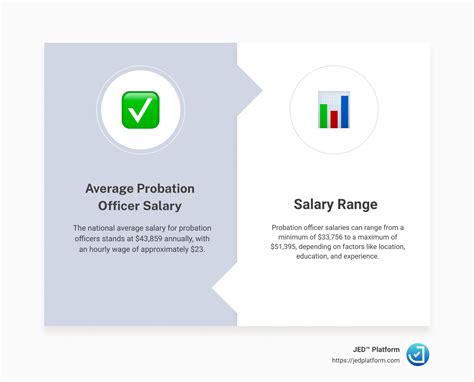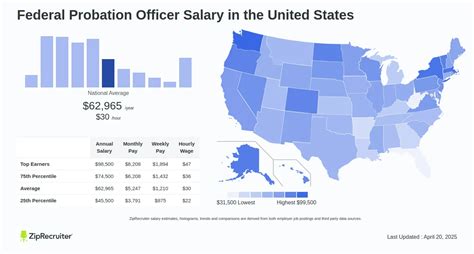A career as a federal probation officer is a unique blend of law enforcement, social work, and public service. It's a demanding path that offers the profound reward of helping individuals reintegrate into society while upholding community safety. For those considering this challenging yet fulfilling profession, a key question is always: What is the earning potential?
A career with the U.S. Courts system not only provides immense stability and robust benefits but also a competitive salary structure. A federal probation officer's salary can range from approximately $50,000 for entry-level positions to well over $120,000 for experienced officers in high-cost-of-living areas.
This guide provides a data-driven look at what you can expect to earn and the key factors that will shape your salary throughout your career.
What Does a Federal Probation Officer Do?

Before diving into the numbers, it's essential to understand the role. Unlike their state and local counterparts, U.S. Probation Officers work for the Judicial Branch of the federal government. Their responsibilities are primarily split into two areas:
- Presentence Investigations: Officers conduct thorough background investigations on defendants convicted of federal crimes. They interview the defendant, their family, employers, and victims, and review extensive records. The result is a comprehensive presentence report that provides a sentencing recommendation to the federal judge, playing a critical role in the judicial process.
- Post-Sentence Supervision: Officers supervise individuals who are on probation or supervised release after serving a prison sentence. They enforce the conditions of release set by the court, conduct regular check-ins and home visits, provide guidance and resources for employment and treatment, and use a combination of support and sanctions to help offenders successfully and safely reintegrate into the community.
Average Federal Probation Officer Salary

Unlike private-sector jobs, federal salaries are highly structured. Federal probation officers are part of the Court Personnel System (CPS), which is similar to the General Schedule (GS) scale used by other federal agencies. An officer's pay is determined by their Classification Level (CL) and Step, plus a significant adjustment for geographic location.
- Entry-Level Salary: New officers are typically hired at the CL 25, CL 26, or CL 27 grade. According to the U.S. Courts, the 2024 salary for these developmental grades, *before* locality pay, ranges from approximately $42,560 (CL 25, Step 1) to $79,860 (CL 27, Step 25). With locality pay, a typical starting salary often falls between $50,000 and $70,000.
- Full Performance Salary: After successfully completing 2-3 years of training and development, officers are typically promoted to the full performance level of CL 28. The 2024 salary for this level, *before* locality pay, ranges from $61,080 (Step 1) to $113,044 (Step 61).
- National Average & Aggregator Data: While the official CPS scale is the most accurate source, salary aggregators provide useful real-world estimates that include locality pay.
- Salary.com reports the median salary for a Probation Officer in the U.S. is around $64,749, with a typical range between $57,868 and $71,836.
- Glassdoor estimates the total pay for a Federal Probation Officer is around $95,500 per year, with a likely range between $80,000 and $115,000.
It's important to note that the U.S. Bureau of Labor Statistics (BLS) reports the median annual wage for all Probation Officers and Correctional Treatment Specialists was $64,480 in May 2023. However, this figure includes state and local officers, who often have lower pay scales than their federal counterparts.
Key Factors That Influence Salary

Your specific salary is not a single number but a figure influenced by several critical factors. Understanding these will give you a clear picture of your career and earning trajectory.
###
Level of Education
A bachelor's degree from an accredited university is the minimum requirement. While the field of study can vary, degrees in criminal justice, social work, psychology, sociology, or public administration are highly relevant. Importantly, possessing a master's degree in a related field or a Juris Doctor (J.D.) can qualify you for a higher starting salary. An applicant with a master's degree may be eligible to start at the CL 27 level, bypassing the lower developmental grades and accelerating their earning potential from day one.
###
Years of Experience
Experience is a primary driver of salary growth in the federal system. The CPS pay scale is built on "Steps." Each year, assuming satisfactory performance, you will advance to the next step within your Classification Level (CL), resulting in a predictable annual pay raise.
The most significant jump occurs when you advance from a developmental grade (CL 25-27) to the full performance level of CL 28. Further promotions to senior or supervisory roles (CL 29 and above) come with substantial salary increases.
###
Geographic Location
This is arguably the most impactful factor on your take-home pay. The federal government uses a Locality Pay Adjustment to account for different costs of living across the United States. This is a percentage-based addition to your base salary.
For example, a CL 28, Step 1 officer's base salary in 2024 is $61,080.
- In a location with low locality pay like Des Moines, IA (18.17% adjustment), the salary would be $72,179.
- In a location with high locality pay like San Francisco, CA (45.41% adjustment), the same officer's salary would be $88,816.
This system ensures that officers in expensive metropolitan areas can afford a comparable standard of living to their colleagues in more rural districts.
###
Employer and Benefits: The Federal Advantage
While not a direct salary factor, the "company type"—in this case, the U.S. Federal Government—provides a total compensation package that far exceeds the base salary. This is a massive draw for the profession and includes:
- Retirement: A three-tiered pension plan including the Federal Employees Retirement System (FERS), Social Security, and the Thrift Savings Plan (TSP), a 401(k)-style plan with a generous 5% government match.
- Health Insurance: Access to a wide variety of premium health, dental, and vision insurance plans through the Federal Employees Health Benefits (FEHB) Program.
- Paid Leave: Generous accrual of annual leave (13 days per year to start, up to 26 days) and sick leave (13 days per year).
###
Area of Specialization
Within the U.S. Probation system, officers can develop expertise in high-need areas. These specializations may not always come with a direct pay differential at the officer level, but they are critical for promotion to specialist and supervisory positions, which do carry higher salaries. Key specializations include:
- Substance Abuse Treatment
- Mental Health Caseloads
- Sex Offender Supervision
- Location Monitoring / Electronic Monitoring
- Computer Forensics and Cybercrime
Developing expertise in these fields makes you an invaluable asset to your district and positions you for career advancement.
Job Outlook

According to the U.S. Bureau of Labor Statistics (BLS), overall employment for Probation Officers and Correctional Treatment Specialists is projected to grow 1 percent from 2022 to 2032, which is slower than the average for all occupations.
However, this figure should be viewed with context. The federal system is highly stable, and the need for qualified officers is constant. Most job openings will result from the need to replace officers who retire or transfer to other careers. This creates a steady stream of opportunities for well-qualified candidates. Competition for these coveted federal positions is strong, making advanced education and relevant experience highly beneficial.
Conclusion

A career as a federal probation officer is a stable, rewarding, and financially sound choice for individuals committed to public service. While the path is competitive, the rewards are significant.
Key Takeaways:
- Strong Earning Potential: Expect a starting salary between $50,000-$70,000, with the potential to earn well over $100,000 with experience, especially in major metropolitan areas.
- Salary is Structured & Predictable: Your pay is determined by your grade (CL), step, and a significant locality pay adjustment.
- Education and Experience are Key: A master's degree can boost your starting salary, while experience leads to consistent promotions and pay raises.
- Benefits are a Major Component: The federal benefits package, including an excellent retirement plan and health insurance, represents a substantial part of your total compensation.
For those with the right skills, education, and dedication, a career as a U.S. Probation Officer offers a unique opportunity to secure your financial future while making a lasting impact on your community.
